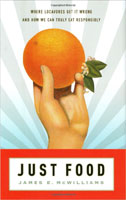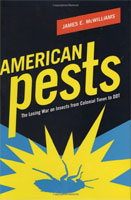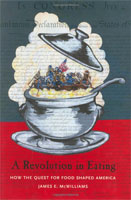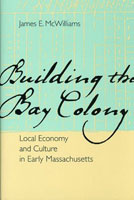Just Food
Where Locavores Get It Wrong and How We Can Truly Eat Responsibly
We suffer today from food anxiety, bombarded as we are with confusing messages about how to eat an ethical diet. Should we eat locally? Is organic really better for the environment? Can genetically modified foods be good for you?
JUST FOOD does for fresh food what Fast Food Nation (Houghton Mifflin, 2001) did for fast food, challenging conventional views, and cutting through layers of myth and misinformation. For instance, an imported tomato is more energy-efficient than a local greenhouse-grown tomato. And farm-raised freshwater fish may soon be the most sustainable source of protein.
Informative and surprising, JUST FOOD tells us how to decide what to eat, and how our choices can help save the planet and feed the world.
American Pests
The Losing War on Insects from Colonial Times to DDT
The world of insects is one we only dimly understand. Yet from using arsenic, cobalt, and quicksilver to kill household infiltrators to employing the sophisticated tools of the Orkin Man, Americans have fought to eradicate the “bugs” they have learned to hate.
Inspired by the still-revolutionary theories of Rachel Carson’s Silent Spring, James E. McWilliams argues for a more harmonious and rational approach to our relationship with insects, one that does not harm our environment and, consequently, ourselves along the way. Beginning with the early techniques of colonial farmers and ending with the modern use of chemical insecticides, McWilliams deftly shows how America’s war on insects mirrors its continual struggle with nature, economic development, technology, and federal regulation. He reveals a very American paradox: the men and women who settled and developed this country sought to control the environment and achieve certain economic goals; yet their methods of agricultural expansion undermined their efforts and linked them even closer to the inexorable realities of the insect world.
A Revolution In Eating
How the Quest for Food Shaped America
Sugar, pork, beer, corn, cider, scrapple, and hoppin’ John all became staples in the diet of colonial America. The ways Americans cultivated and prepared food and the values they attributed to it played an important role in shaping the identity of the newborn nation. In A Revolution in Eating, James E. McWilliams presents a colorful and spirited tour of culinary attitudes, tastes, and techniques throughout colonial America.
Confronted by strange new animals, plants, and landscapes, settlers in the colonies and West Indies found new ways to produce food. Integrating their British and European tastes with the demands and bounty of the rugged American environment, early Americans developed a range of regional cuisines. From the kitchen tables of typical Puritan families to Iroquois longhouses in the backcountry and slave kitchens on southern plantations, McWilliams portrays the grand variety and inventiveness that characterized colonial cuisine. As colonial America grew, so did its palate, as interactions among European settlers, Native Americans, and African slaves created new dishes and attitudes about food. McWilliams considers how Indian corn, once thought by the colonists as “fit for swine,” became a fixture in the colonial diet. He also examines the ways in which African slaves influenced West Indian and American southern cuisine.
Building the Bay Colony
Local Economy and Culture in Early Massachusetts
Historians often consider transatlantic trade and the export of staples to have been the driving forces behind economic development in virtually all of colonial America. In From the Ground Up: How the Massachusetts Bay Colony Achieved Economic Success, James E. McWilliams challenges this assumption, showing how internal economic development, rather than exports that shareholders hoped would provide a handsome return on their investments, actually served as the backbone of the Massachusetts economy.
Starting with the basics - the building of farms, fences, stables, roads, and bridges - McWilliams demonstrates through careful analyses of farmer and merchant account books how these small infrastructure improvements established the foundation for more ambitious, overseas adventures. Using an intensely local lens, McWilliams explores the century-long process whereby the Massachusetts Bay Colony went from a distant outpost of the incipient British Empire to a stable society integrated into the transatlantic economy.





